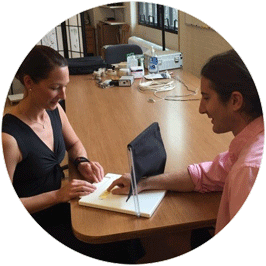 The broad nature of the medical rehabilitation field means that no single agency or organization can do it all. NCMRR collaborates with many other government agencies and organizations to help advance medical rehabilitation research and care.
The broad nature of the medical rehabilitation field means that no single agency or organization can do it all. NCMRR collaborates with many other government agencies and organizations to help advance medical rehabilitation research and care.
The following list includes some of the center's partners outside of NIH. For links to tools and data related to rehabilitation, visit the Research Tools and Resources page.
In addition, https://www.dol.gov/agencies/odep/topics offers resources on benefits, civil rights, community life, education, emergency preparedness, employment, health, housing, technology and transportation for people with disabilities, their families, veterans, educators, employers, and others.
- Agency for Healthcare Research and Quality (AHRQ)
NCMRR works with the agency to help fulfill its mission to produce evidence that improves health care safety, quality, accessibility, equitability, and affordability and to ensure the appropriate interpretation and use of evidence. - Centers for Disease Control and Prevention (CDC)
Thecenter’s work with CDC includes activities with: the Division of Reproductive Health on collecting data about new mothers with disabilities; the National Center on Birth Defects and Developmental Disabilities on interagency goals to improve the health of people with disabilities and to gather data on behavioral risk factors among people with disabilities; and the National Center for Injury Prevention and Control on improving outcomes from injury and violence. - Centers for Medicare & Medicaid Services (CMS)
Activities with CMS include research to inform Coverage with Evidence Development guidance for Medicare, as well as Medicare’s clinical trial policies on coverage for routine patient care and care related to clinical trial participation. - U.S. Food and Drug Administration (FDA)
Much of NCMRR’s work with FDA is focused within the Center for Devices and Radiological Health (CDRH), which focuses on timely and continued access to safe, effective, and high-quality medical devices and radiation-emitting products. The center is also involved with the Office of Health Technology 5, which focuses on neurological and physical medicine devices, and the Payor Communication Task Force, which improves communication between device manufacturers and insurers to potentially decrease the time between FDA's approval of a premarket application and the subsequent CMS national coverage determination. Both are managed by CDRH. - National Institute on Disability, Independent Living, and Rehabilitation Research (NIDILRR), Administration for Community Living
NCMRR activities with this agency focus on generating and promoting new knowledge to improve the abilities of people with disabilities to perform activities of their choice in the community, and to expand society's capacity to provide full opportunities and accommodations for its citizens with disabilities.
- Biological Technologies Office
, Defense Advanced Research Projects Agency (DARPA)
DARPA’s Biological Technologies Office develops capabilities that embrace the unique properties of biology—adaptation, replication, complexity—and applies those features to revolutionize how the United States protects all its service members. - Medical Research and Development (MR&D)
, U.S. Army MR&D Command
NCMRR’s work with this program focuses on definitive and rehabilitative care innovations required to reset our wounded warriors, both in terms of duty performance and quality of life. - Research Programs
, Congressionally Directed Medical Research Programs
The center works with this office on medical research programs related to spinal cord injury and traumatic brain injury as well as its clinical and rehabilitation research program.
- Health Services Research and Development (HSR&D)
NCMRR collaborates with different components of the VA to enhance HSR&D, which encompasses all aspects of VA health care, focusing on patient care, cost, and quality. - Rehabilitation Research & Development (RR&D) Service
The center also works with the RR&D service to generate knowledge and innovations that advance the rehabilitative health and care of veterans and the nation.
Department of Transportation (DOT)
NCMRR collaborated with DOT on the now-archived Accessible Transportation Technologies Research Initiative (ATTRI), which focused on removing barriers to transportation for people with visual, hearing, cognitive, and mobility disabilities. ATTRI supported development of technology and creative service models to offer all Americans enhanced travel choices and accessibility.
Office of Disability Employment Policy (ODEP), Department of Labor
Through ODEP, NCMRR helps to generate and validate evidence to inform policies and practices that increase the number and quality of employment opportunities for people with disabilities.
Patient-Centered Outcomes Research Institute (PCORI)
This nongovernmental organization was authorized by Congress in the Patient Protection and Affordable Care Act of 2010 to improve the quality and relevance of evidence available to help people make informed health decisions. NCMRR has worked with PCORI on research projects on muscular and skeletal disorders, neurological disorders, and trauma/injury; visit https://www.pcori.org/explore-our-portfolio for more information.
National Science Foundation (NSF)
Among the collaborations between NCMRR and NSF is the Disability and Rehabilitation Engineering (DARE) program, which supports engineering research to improve the quality of life of persons with disabilities. DARE’s work includes development of new technologies, devices, or software; advancement of knowledge regarding typical or pathological human motion; or understanding of injury mechanisms.
Common Data Elements (CDEs) for Lower Limb Loss Research Standards
CDEs make it easier for researchers to share, compare, and replicate findings; generalize results; and integrate data across studies. NCMRR is working with other NIH institutes and centers, as well as AHRQ, CMS, FDA, and NIDILRR within HHS, DoD, and the VA to establish and recommend two types of CDEs for lower limb loss research: Core Variables and Supplemental Variables. Using CDEs in this research can help optimize investment, accelerate and enhance understanding of those with lower limb loss, and advance a culture of scientific collaboration. Please check back for additional details about this effort.
- Supplemental Information from the Request for Information (RFI) to Solicit Input on Common Data Elements for Lower Limb Loss Research (PDF 1.1 MB)
- Those who would like a copy of the original tables from this PDF can email their request to Rehabilitation1@mail.nih.gov.
 BACK TO TOP
BACK TO TOP